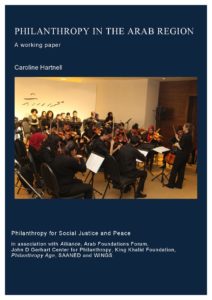By Atallah Kuttab

The working paper titled Philanthropy in the Arab Region succeeds in giving a comprehensive overview of the current state of philanthropy in the Arab region. Philanthropy is embedded in the culture of the region. The paper emphasizes the long history of giving encouraged by religious belief and the concept of social solidarity (Takaful). The fact that it is not fixated on taxonomy enables it to capture the whole range of traditional and emerging modes of giving and social engagement at both individual and institutional levels. Despite many similarities, the differences between regions (Levant, Maghreb and Gulf regions) are crucial and need always to be kept in mind; much needs to be unravelled there.
How much is philanthropy changing?
 Almost everybody that contributed to the report believes that philanthropy in the region is expanding beyond religiously motivated giving and giving to family and relatives. The emerging trend in Arab philanthropy of moving from a charitable/religious approach to more of a developmental approach is a constant theme among all contributors. Despite this, it is yet to be seen that this transformation is really happening. Most giving still goes to religious or pseudo government organizations that are more known for ‘hands out’ and ‘giving a fish every day’ rather than ‘hands on’ and ‘teaching how to fish’, thus perpetuating reliance rather than independence and self-integrity. The focus of such efforts is contributing both to relieving the immediate needs of the poor through provision of basic services and to the medium-term goals of sustainable development (namely education, health and economic empowerment). Philanthropy realistically can provide innovative long-term solutions that could be scaled up only when the state and the private sector come together with it to provide the necessary policy reform (state) and financial resources (private sector).
Almost everybody that contributed to the report believes that philanthropy in the region is expanding beyond religiously motivated giving and giving to family and relatives. The emerging trend in Arab philanthropy of moving from a charitable/religious approach to more of a developmental approach is a constant theme among all contributors. Despite this, it is yet to be seen that this transformation is really happening. Most giving still goes to religious or pseudo government organizations that are more known for ‘hands out’ and ‘giving a fish every day’ rather than ‘hands on’ and ‘teaching how to fish’, thus perpetuating reliance rather than independence and self-integrity. The focus of such efforts is contributing both to relieving the immediate needs of the poor through provision of basic services and to the medium-term goals of sustainable development (namely education, health and economic empowerment). Philanthropy realistically can provide innovative long-term solutions that could be scaled up only when the state and the private sector come together with it to provide the necessary policy reform (state) and financial resources (private sector).
Can philanthropy tackle root causes?
Some of the issues and challenges that still need further deciphering and better understanding revolve around the main theme, namely: can philanthropy take risk and tackle the root causes of societal ills? The Arab Spring gave such courage, though it was only for a short period of time, less than one year, before philanthropic organizations went back to old habits of focusing efforts on services that address the symptoms of these ills rather than the causes.
The Arab Spring highlighted issues of citizenship, integrity of citizens, and social justice and equity. One indicator for the future development of philanthropy in our region beyond its traditional role will be organizations dealing with human rights becoming less dependent on funding coming from abroad and more successful in raising funds locally to create more local ownership. The current interest in the Sustainable Development Goals, which advocate cooperation of all concerned, might be an opportunity to build partnerships for better integration of social investment focusing on root causes as well as services.
It will also be important for philanthropic organizations, in their efforts to achieve social change, to use their funds to make grants to NGOs rather than using their own staff for direct implementation of programmes, as seems to be the norm at present. If they continue in this way, then they are opting to walk fast rather than far!
Another challenge for the future is how much the regulatory structures in our region can encourage horizontal philanthropy – giving by ordinary people and not just the rich, whether through community foundations or through new modalities like crowdfunding.
A major disruption in the future, well covered in the paper, is the blurring of boundaries between for-profit and not-profit sectors and the formation of social enterprises. It is hoped this will be an opportunity for philanthropy to change its role. It will be interesting to see how much cooperation happens between philanthropy, civil society (especially NGOs), private sector and government in this respect and how much we will benefit from such opportunities. It will be a missed opportunity if such cooperation is confined to projects that promote the provision of services, avoiding those projects that address deep structural reasons for societal ills and lead to a more equitable society.
Philanthropy in the Arab Region is written by Caroline Hartnell and published by Philanthropy for Social Justice and Peace in association with Alliance, Arab Foundations Forum, John D Gerhart Center for Philanthropy, King Khalid Foundation, Philanthropy Age, SAANED and WINGS.
Atallah Kuttab is founder of SAANED for Philanthropy Advisory in the Arab Region.